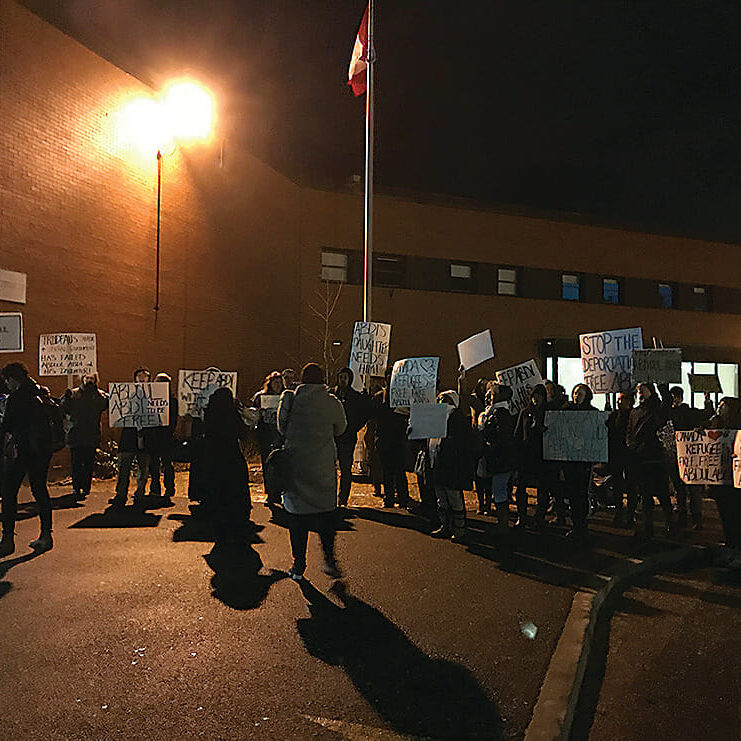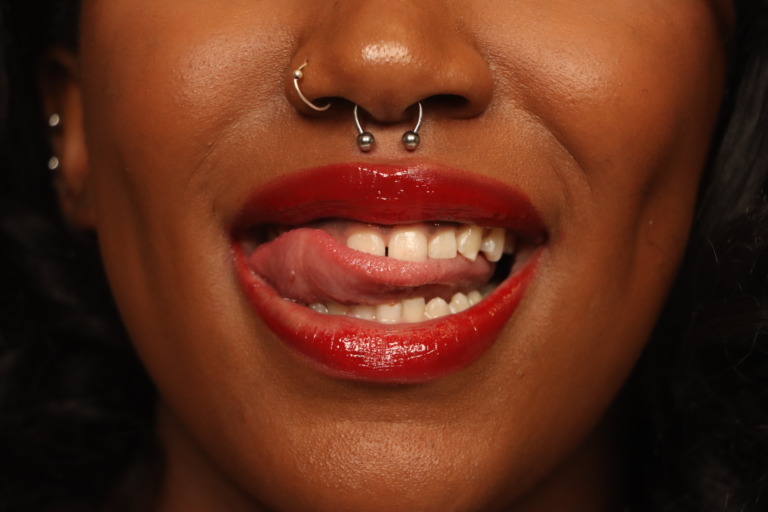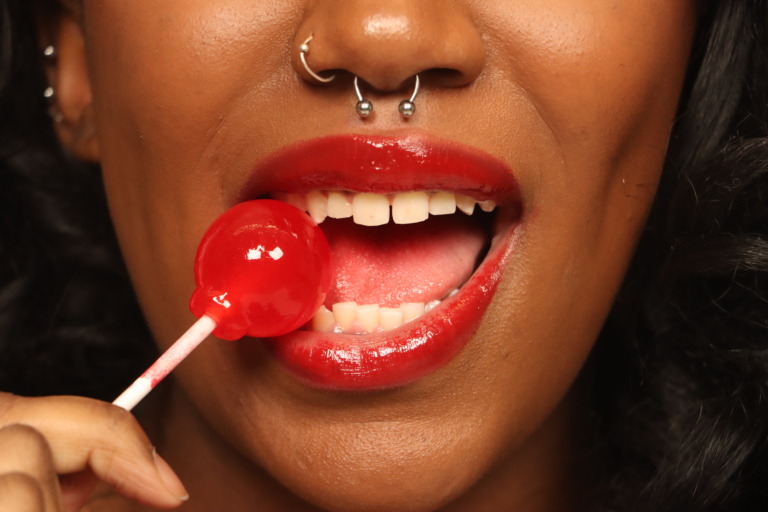
Abdoul Abdi’s sister Fatouma confronts Justin Trudeau at Sackville town hall
DSU helped organize protest of Abdi's deportation
The joint parking lot for Sackville High School and Sackville Sports Stadium is packed.
Roving cars are hunting for spots, but there aren’t many to be had. By this point in the night, most of these drivers will have to resign themselves to parking on the dark road leading to the school.
For the lucky who got a spot in the parking lot, it’s a short walk to the high school, where a long line awaits. It snakes out of the front doors and keeps close to the outside wall of the school – to see Prime Minister Justin Trudeau patience is required.
As the attendees wait outside, a tireless protest proceeds beside the line. Two of them, actually.
The first, and decidedly smaller: two mothers against Lyme disease. But they are entirely overshadowed by the bulk of the protestors, who are demanding justice for Abdoul Abdi.
Abdi first came to Canada as a child refugee from Somalia when he was six years old.
Two of his aunts brought him and his sister Fatouma Abdi, who was eight at the time. When they arrived in Canada, the aunts applied for citizenship for the whole lot. However, Abdoul and Fatouma were taken away from their aunts by child welfare services shortly after they arrived.
Child services cancelled their citizenship applications and never filed new ones.
As a result, Abdoul and Fatouma remained long-term permanent residents of Canada despite growing up here for 17 years, while their aunts were granted citizenship.
A few weeks ago, Abdi completed a four-year prison sentence for assault. Upon his release, immigration services immediately apprehended him and placed him in solitary detention as the government decided whether he should be deported.
That’s where he sits on the night of Trudeau’s town hall. As dozens of people protest his detainment outside.
“I’m here to demand for the deportation of Abdoul Abdi to stop,” says Amina Abawajy, President of the Dalhousie Student Union and one of the organizers of the protest. “The rally was organized in pretty quick order. We found out that Justin Trudeau was coming about two days ago from the news, and we thought it would be an opportunity to bring this issue directly to him.”
Third-year law school student Rosalea Thompson saw news of the protest on social media and decided to participate.
“I think it’s really important, especially as someone who’s going to go into the legal profession, to have a critical stance on our current refugee and immigration and criminal law system,” she says. “I know that this young man spent a lot of years in the foster system, the child quote-unquote ‘welfare’ system, and I know that that system lets kids down.”
Inside the Sackville High gym where the town hall is happening, there’s a contingent in place to ask Trudeau about Abdi’s situation. The one who will actually ask the question?
That would be Fatouma Abdi.
“I’m here to try to get my brother stopped from getting deported back to Somalia. We have no family back home, we both don’t know their language anymore, and we don’t know the culture. Like, we’re stripped from our culture. It would be a death sentence for him to go back home, because he has no connections back there,” she says.
“He’s basically looking at a death penalty in my eyes because there’s no government back home,” she says. “Canadian officials are scared to go to Somalia, so why do they think that a boy that was raised Canadian would be okay back there?”
The room is divided into four main areas, with hundreds of chairs in each. Trudeau will take a few questions from each section. He starts with the section across from the Abdi contingent, meaning theirs will be the third one he gets to.
The questions Trudeau receives range from confrontational to open-ended to French. It becomes clear that he cannot tell the audience much more than they would be able to figure out from researching the question themselves; the town hall is more of an event to make the prime minister appear accessible than to talk meaningfully about policy.
How will that approach work on a question about a specific situation like Abdi’s?
If Fatouma Abdi even gets to ask it, that is.
Trudeau is finally on her section. First, he picks a woman dressed in Canadian flag swag, and gets burned: she asks him about his recent ethics violation.
Then he picks a young girl in a flashy vest, and gets burned: she asks him about Omar Khadr.
He picks a few more people from the section, but not Fatouma Abdi or anyone else from the group.
Their opportunity is lost.
In the next section, Trudeau picks another person in flashy attire. “You sir, in the beautiful scarf!” he says to Ifo Ikede.
Ikede starts speaking, walking down the aisle as he does. He hands the microphone off to Fatouma Abdi, declaring, “You mention you don’t want any other person to be abused in this country. Right now we have someone who has been abused for more than 20 years by the Nova Scotia government and the government of Canada,” he continues, “and his sister is here.”
Fatouma Abdi stands up, with Abawajy and El Jones flanking her. Her question is simple: “Why are you deporting my brother? (at 56:42)
She goes on to explain the details of his situation, how he came as a child and lived his whole life in Canada. How he has a daughter in Canada. How the system failed him by placing him in temporary and sometimes abusive living situations – more than 20 before he had turned 19 – and failing to secure his citizenship.
Trudeau doesn’t have an answer for her.
He says he can’t comment on the specific case because it’s still under review. He says Canada takes all these decisions very seriously, but also that part of the reason Canadians, on the whole, are so supportive of immigration is precisely because the country takes its rules seriously.
To Fatouma Abdi, he might as well be saying nothing.
“I don’t really think that he answered or gave me the answers I was looking for, but now I [have] his attention, I know that he can’t just sweep it under the rug and he has to answer. So I hope my brother is free soon and everything goes away and that we can soon go for our Canadian citizenship,” she says.
Abdi’s situation raises some complex questions with no easy answers. For example, if one section of the government infrastructure clearly and obviously fails someone – like, say, child services not securing citizenship – should other sections take that into account? And how can we balance the rights of non-citizens who have spent a significant portion of their lives in Canada, especially ones who grew up here, with the laws governing their conduct? They have no easy answers, but they are only being of Abdi because the government failed him.
“I was fortunate to know Abdoul Abdi,” says Abawajy. “I attended some classes with him in elementary school, and to know that that was the last time that he had attended any form of education speaks to the number of systems that failed him. Not only was it the educational system and the child welfare system, but the political system and many other systems. So it is a failure of the system, and it is up to all of us to stand up and speak about it.”
Since the town hall, Abdi was moved out of solitary detention to regular confinement in Toronto. Shortly after that, he was moved to a halfway house in Toronto, where he resides as of this writing. But his ordeal isn’t over – the government could still decide to deport him.
An hour after posing her question to the Prime Minister, Fatouma Abdi is candid about how Canada has let her and her brother down.
“Our home was falling apart, there was no stable anything, so my mom brought us to Canada to have a better life. But we had, sorry for my language, a shittier life because we never had a stable life,” she says.






